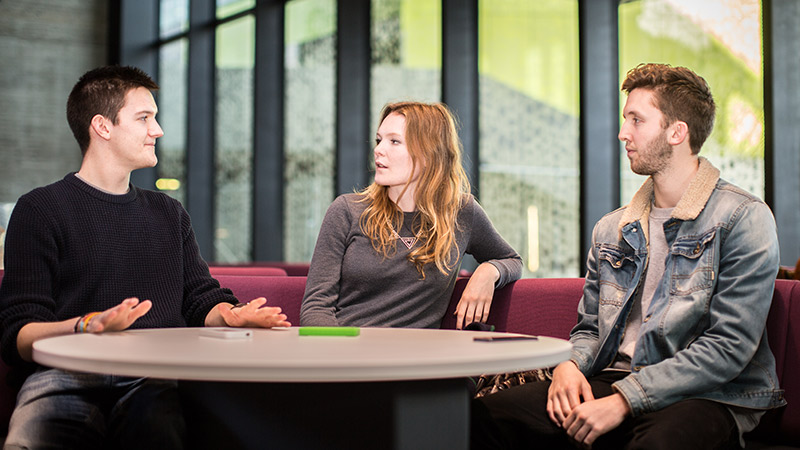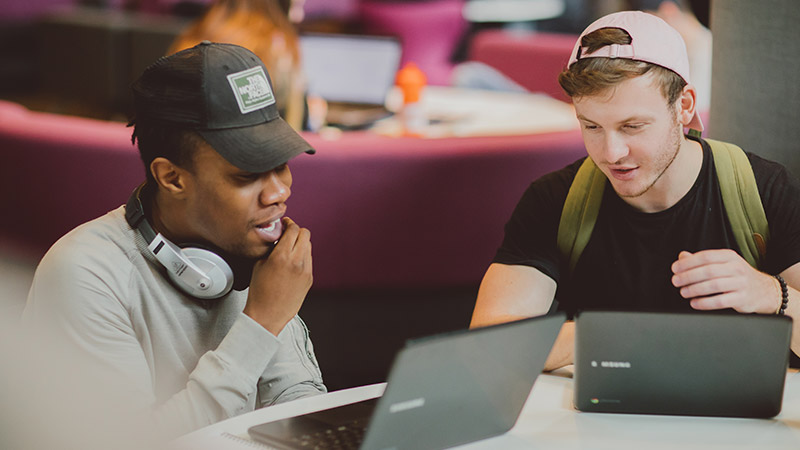English Literature (with Foundation Year)
BA (Hons)
UCAS code: Q320
Start dates: September 2026
Full time: 4 Years, or 5 if year abroad or work placement is chosen
Part time: Up to 11 years
Location: Headington
Overview
Would you like to explore the biggest questions and ideas that have inspired writers and thinkers across the centuries? Study English Literature at Oxford Brookes, and you will examine critical moments and movements in culture and society.
English Literature (with Foundation Year) is a unique integrated degree programme, enabling you to develop academic skills crucial to university study, such as critical analysis, academic writing and collaboration. We'll support you as you grow your confidence, get to know your strengths and build your knowledge.
In your first year, you will undertake our Humanities Foundation course. You'll then progress to the three year undergraduate course in English Literature, with an opportunity to do an optional study abroad or work placement as an additional year. With the diverse experience and skills you'll gain, you'll be fully prepared for a career in a variety of sectors.

Why Oxford Brookes University?
-
Perfect preparation
Build essential study skills with an integrated foundation year. Gain academic confidence, improve critical thinking, and strengthen subject knowledge for your degree journey.
-
Expert academics
Our academic staff are respected in their fields, publishing research that influences thought around the world.
-
Begin to specialise
Literature is a big field, and we’ll help you find your niche within it, whether you’re interested in Victorian Gothic literature, women and modernism, or literature and madness.
-
Gain work experience
Experience the world of work and apply your skills in areas like publishing or literary festivals.
-
Additional language modules
Our university-wide language programme is available to full-time undergraduate and postgraduate students on many of our courses, and can be taken as a credit on some courses.
Course details
Study modules
Teaching for this course takes place face to face, and you should also anticipate a workload of 1,200 hours per year. Teaching usually takes place Monday to Friday, between 9.00am and 6.00pm.
Contact hours involve activities such as lectures, seminars, practicals, assessments, and academic advising sessions. These hours differ by year of study and typically increase significantly during placements or other types of work-based learning.
Please note: As our courses are reviewed regularly as part of our quality assurance framework, the modules you can choose from may vary from those shown here. The structure of the course may also mean some modules are not available to you.
Careers
Our aim is for you to become an engaged and thoughtful citizen of the world who can argue for what they believe in. The skills you’ll develop on the BA (Hons) English Literature (with Foundation Year) degree are highly transferable and are prized across many sectors. Our graduates go on to work in a variety of areas, such as:
- arts, culture and heritage
- NGOs and charities
- academic research
- teaching
- publishing
- media and journalism
- public relations, marketing and communications.
Recent graduates have gone on to work for employers such as the Duckegg Theatre, Oxford University Press, Paragon Banking Group and The British Museum.
Entry requirements
Wherever possible we make our conditional offers using the UCAS Tariff. The combination of A-level grades listed here would be just one way of achieving the UCAS Tariff points for this course.
Standard offer
UCAS Tariff Points: 48
A Level: DD
IB Points: 24
BTEC: PPP or MP
Further offer details
Applications are welcomed from candidates with alternative qualifications, and from mature students.
Specific entry requirements
Please also see the University's general entry requirements.
English language requirements
Applicants whose main language is not English should have IELTS 6.0.
Please also see the University's standard English language requirements.
English requirements for visas
If you need a student visa to enter the UK you will need to meet the UK Visas and Immigration minimum language requirements as well as the University's requirements. Find out more about English language requirements.
Credit transfer
Many of our courses consider applications for entry part-way through the course for students who have credit from previous learning or relevant professional experience.
Find out more about transferring to Brookes. If you'd like to talk through your options, please contact our Admissions team.
Terms and conditions of enrolment
When you accept our offer, you agree to the Terms and Conditions of Enrolment. You should therefore read those conditions before accepting the offer.
How to apply
Application process
Full time international applicants can also apply through UCAS
Tuition fees
Questions about fees?
Contact Student Finance on:
Tuition fees
Please note, tuition fees for Home students may increase in subsequent years both for new and continuing students in line with an inflationary amount determined by government. Oxford Brookes University intends to maintain its fees for new and returning Home students at the maximum permitted level.
For further information please see our tuition fees FAQs.
Tuition fees for International students may increase in subsequent years both for new and continuing students.
The following factors will be taken into account by the University when it is setting the annual fees: inflationary measures such as the retail price indices, projected increases in University costs, changes in the level of funding received from Government sources, admissions statistics and access considerations including the availability of student support.
How and when to pay
Tuition fee instalments for the semester are due by the Monday of week 1 of each semester. Students are not liable for full fees for that semester if they leave before week 4. If the leaving date is after week 4, full fees for the semester are payable.
- For information on payment methods please see our Make a Payment page.
- For information about refunds please visit our Refund policy page
Additional costs
Please be aware that some courses will involve some additional costs that are not covered by your fees. Specific additional costs for this course are detailed below.
Compulsory costs
| Additional costs | Amount (£) |
|---|---|
| Disclosure Barring Service (DBS) initial check (if you undertake specific modules or placements in some providers) | £54 |
Optional costs
| Additional costs | Amount (£) |
|---|---|
You may choose to purchase books to support your studies. Many books on our reading lists are available via the Library, or can be purchased secondhand. |
£10-30 |
It’s your responsibility to cover print / binding costs where coursework submission is required. Please note that a lot of the coursework is now submitted online. |
From £30 |
Accommodation fees in Brookes Letting (most do not include bills) |
£107-301 per week |
Accommodation fees in university halls (bills included, excluding laundry costs) |
£139-248 per week |
Graduation costs include tickets, gowning and photography. Gowns are not compulsory but typically students do hire robes, starting at £41. |
Typically £0-200 |
Students are responsible for their own travel to and from university for classes. For the 2025/26 academic year, the University is introducing an alternative subsidised travel offer for all students with further information on our Travel webpages. |
From £10 |
Funding your studies
Financial support and scholarships
Featured funding opportunities available for this course.
All financial support and scholarships
Information from Discover Uni
Full-time study
Part-time study
Programme changes:
On rare occasions we may need to make changes to our course programmes after they have been
published on the website. For more information, please visit our
changes to programmes page.

